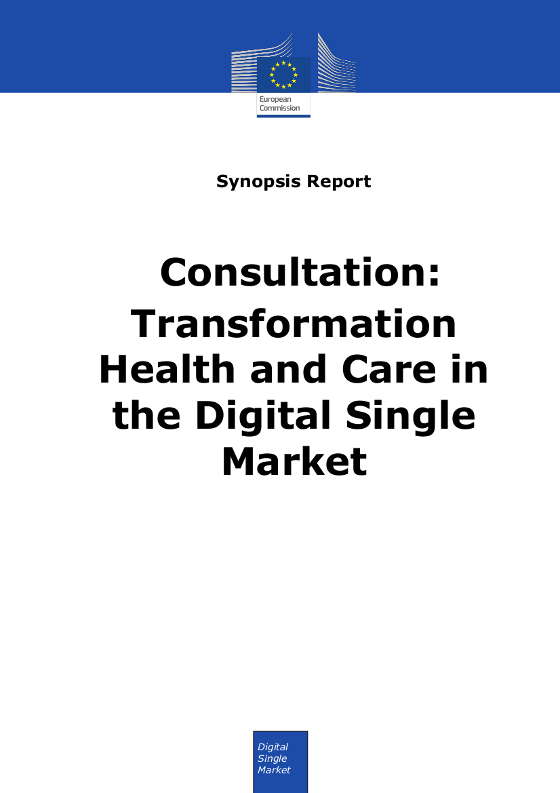 The present report provides an analysis of the results of consultation activities carried out by the European Commission in preparation of a Communication on the Transformation of Health and Care in the Digital Single Market. The main findings show that over 93% of over 1400 respondents to an online questionnaire believe that "Citizens should be able to manage their own health data". Furthermore, 83% of all respondents either agree or strongly agree with the statement that "Sharing of health data could be beneficial to improve treatment, diagnosis and prevention of diseases across the EU". The overwhelming majority of all respondents (73.6%) identify improved possibilities for medical research as a reason for supporting cross border transfer of medical data, which was higher than for their purpose of their own treatment (67.8%). Risks of privacy breaches and of cybersecurity are on the top of the lists among the major barriers identified to the cross-border transfer of medical data. Other than these, the current lack of infrastructure (51%) and the heterogeneity of electronic health records (58.2%) also scored high on the lists. To overcome these barriers, the following activities for the EU were strongly supported: developing standards for data quality and reliability (59.6%), standardizing electronic health records (56.8%), proposing health-related cybersecurity standards (54.4%) and supporting interoperability with open exchange formats (53.4%). To propose legislation setting the technical standards enabling citizen access and exchange of Electronic Health Records across the EU was supported by nearly 40% of respondents.
The present report provides an analysis of the results of consultation activities carried out by the European Commission in preparation of a Communication on the Transformation of Health and Care in the Digital Single Market. The main findings show that over 93% of over 1400 respondents to an online questionnaire believe that "Citizens should be able to manage their own health data". Furthermore, 83% of all respondents either agree or strongly agree with the statement that "Sharing of health data could be beneficial to improve treatment, diagnosis and prevention of diseases across the EU". The overwhelming majority of all respondents (73.6%) identify improved possibilities for medical research as a reason for supporting cross border transfer of medical data, which was higher than for their purpose of their own treatment (67.8%). Risks of privacy breaches and of cybersecurity are on the top of the lists among the major barriers identified to the cross-border transfer of medical data. Other than these, the current lack of infrastructure (51%) and the heterogeneity of electronic health records (58.2%) also scored high on the lists. To overcome these barriers, the following activities for the EU were strongly supported: developing standards for data quality and reliability (59.6%), standardizing electronic health records (56.8%), proposing health-related cybersecurity standards (54.4%) and supporting interoperability with open exchange formats (53.4%). To propose legislation setting the technical standards enabling citizen access and exchange of Electronic Health Records across the EU was supported by nearly 40% of respondents.
Thus, there is strong support among respondents for European Union action on privacy, security and interoperability of healthcare data, as well as for training of a skilled workforce with the necessary IT skills and competences to deliver improved patient-centred care.
Download: Consultation: Transformation Health and Care in the Digital Single Market (2.775 KB).
Download from eHealthNews.eu: Consultation: Transformation Health and Care in the Digital Single Market (2.775 KB).